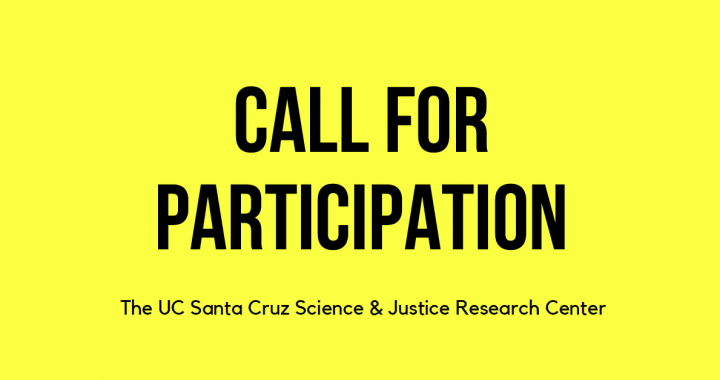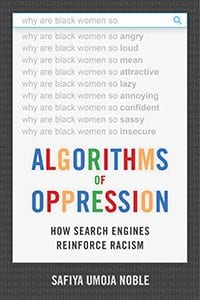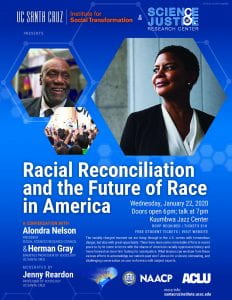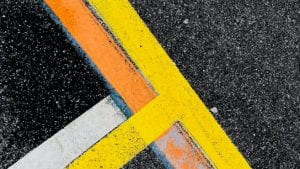Professor Yi along with 26 undergraduate and graduate students will visit Santa Cruz beginning Sunday, January 29th for a two week visit! Select in-person lectures and activities allow for a few additional guests to join. Express interest by selecting which activities you are interested in attending by marking any that apply in this Google Form. Note: times will be posted as confirmed.
All activities are in-person unless otherwise noted.
Day 1 Sunday, January 29: Free Exploration + Arrival to Santa Cruz
- Travel to Santa Cruz, check into hotel, sightsee and explore as time permits.
Day 2 Monday, January 30: UC Santa Cruz
- 11:00 am – 12:30 pm. Welcome Lunch + Lecture with JENNY REARDON: “Welcome and Introduction to the Science & Justice Research Center: Origins of Science & Justice and Current Activities” [Location: The Oakes College Mural Room].
- 4:00 pm – 5:30 pm. Lecture: KAREN MIGA, JAMES DOUCET-BATTLE, and JENNY REARDON: “Personalized Medicine, Biotechnology, Justice, and Inclusion” [Location: The Oakes College Mural Room].
- 5:30 pm – 7:30 pm. Welcome Dinner with SNU + UCSC Participants and Organizers [Location: Oakes College Provost House].
Day 3 Tuesday, January 31: UC Santa Cruz
- 10:00 am – 11:00 am. Lecture: JAMES DOUCET-BATTLE: “Training the Next Generation of Scientists and Engineers.” A conversation through a compounded STS, ELSI/bioethics, and health disparities lens, with allied reference to SJRC’s UC-HBCU work with North Carolina Agricultural & Technical State University and the UCSC Genomics Institute. [Location: The Oakes College Mural Room].
- 12:15 pm – 1:30 pm. Lecture with C.O.A.S.T.: JEREMY SANFORD and JENNY REARDON: “Open Access Splicing Therapeutics: for rare diseases and the questions of ethics and justice raised by this novel area of research.” [reading: 2021 Lakshman “Normalizing Slow Science.”] [Location: Biomed 300; map].
Day 4 Wednesday, February 01: UC Santa Cruz + Free Exploration Downtown Santa Cruz
- 4:00 pm – 6:00 pm. Sawyer Seminar with KAUSHIK SUNDER RAJAN on Ethnographic Trans-formations: Cases, Life Histories, and Other Entanglements of Emergent Research [Location: Humanities 1, Room 210; map].
Day 5 Thursday, February 02: Free Exploration San Francisco
- 10:00 am – 12:00 pm Visit de Young Museum
- Free Exploration at Golden Gate Park
- 5:00 pm Dinner at San Francisco Piers
- 6:00 pm – 8:00 pm Visit Exploratorium After Dark exhibit
- 8:00 pm – 9:00 pm Return to Carousel Beach Inn
Day 6 Friday, February 03: Silicon Valley
- Stanford University campus tour
- 11:00 am – 12:00 pm. Computer History Museum
- 12:30 pm – 1:30 pm Lunch with DONGOH PARK
- 1:30 pm – 2:30 pm Google Office Tour with DONGOH PARK (Senior Policy Advisor, Global Policy & Standards, Trust & Safety).
- 2:30-3:30 pm Lecture: DONGOH PARK: “Google’s Trust and Safety Operations”
- 6:30 pm Dinner with SNU OIA DIRECTORS [Location: TBD near Carousel Beach Inn]
Day 7 Saturday, February 04: San Francisco
- Morning: Free Exploration
- 1:00 pm. “Welcome To UC San Francisco” by JULIE HARRIS-WAI. [Location UC San Francisco, Mission Bay Campus, Fisher Banquet West room]
- 1:15 pm – 2:15 pm. Discussion with FRED TURNER (Stanford University) on “Arts and Innovation”. [Location UC San Francisco, Mission Bay Campus, Fisher Banquet West room].
- 2:30 pm – 3:00 pm. DENNIS BROWE (UCSC), Introduction to the Just Biomedicine “SF Third Street Project.”
- 3:00 pm – 4:30 pm. “SF Third Street Walking Tour” with JENNY REARDON and DENNIS BROWE. [Begins at UCSF Mission Bay campus].
Day 8 Sunday, February 05: Free Exploration
- 8:30 am – 10:00 am. Carousel Beach Inn → San Francisco MoMA
- 10:00 am. Free Exploration of San Francisco MoMA
- Ragnar Kjartansson, *The Visitors* (“Revisiting ‘The Visitors’: An Oral History of Ragnar Kjartansoon’s multimedia masterpiece”)
- TBD Option 1: Bike across Golden Gate Bridge (rentals: Sports Basement in the Presidio, Blazing Saddles, Golden Gate Bridge Bike Rentals).
- TBD Option 2: walking tour of Haight-Ashbury, Castro District, and Twin Peaks
- TBD Option 3: laze away at North Beach coffee houses, browse through books at City Lights Bookstore
- 6:30 pm. Dinner at Haight-Ashbury
- 8:00-9:30 pm. San Francisco → Carousel Beach Inn
Day 9 Monday, February 06: UC Santa Cruz
- 10:30 am – 12:00 pm. Lecture: ANNA FRIZ, YOUNGEUN KIM, DOROTHY SANTOS: “Arts and AI Innovations” [Location: The Oakes College Mural Room].
- 1:30 pm. Lecture and Lab Visit with TAMARA PICO: “Geoscience and Colonialism” [Location: Earth & Planetary Sciences A308, map].
- 3:30 pm – 4:30 pm. Lecture: CHESSA ADSIT-MORRIS: “Leadership in the Equitable and Ethical Design (LEED) of STEM Research.” [reading: 2023. Reardon et all. “Trustworthiness Matters: Building Equitable and Ethical Science” CELL] [Location: The Oakes College Mural Room].
- 5:30 pm – 7:00 pm. Conversation + team dinner with the UCSC EVERETT PROGRAM FELLOWS and CHRIS BENNER [Location: room 47, Social Sciences 2 Building, map]
Day 10 Tuesday, February 07: UC Santa Cruz
- Asynchronously: Watch recorded lectures by S&J colleagues:
- 1:00 pm – 2:30 pm. TIFFANY WISE-WEST with the UCSC SUSTAINABILITY OFFICE SUSTAINABILITY & EQUITY SPECIAL PROJECTS MANAGER ILEANA BRUNETTI with STUDENT SUSTAINABILITY AND ENVIRONMENTAL JUSTICE AMBASSADOR IZZY LAYNE and WATER & CLIMATE ACTION MANAGER ELLEN VAUGHAN: “Innovative Relationships, Environmental Justice and the City”. [reference: Inclusive Sustainability and the City of Santa Cruz Climate Action Plan 2030] [Location: The Oakes College Mural Room].
- 3:00 pm – 4:00 pm. Follow up discussions on recorded lectures by S&J colleagues led by CHESSA ADSIT-MORRIS:
Day 11 Wednesday, February 08: UC Santa Cruz
- 10:30 am – 11:30 am. CHRISTINE HONG: “Human Rights, War Technology and North Korea” [reading: 2013 Hong. “The Mirror of North Korean Human Rights: Technologies of Liberation, Technologies of War” Critical Asian Studies.] [Location: Humanities 1, Room 202; map].
- 12 noon – 1:00 pm: Conversion with the UCSC IBSC Stem Cell Journal Club with CAMILLA FORSBERG, JENNY REARDON, LINDSAY HINCK on “Stem Cells & Justice: Lessons Learned” [reading: 2008 Saunders and Savulescu. “Research Ethics and Lessons from Hwanggate: What Can We Learn from the Korean Cloning Fraud?”] [Location: University Center, Alumni Room; map].
- 1:30-2:30 pm Follow-up discussion on KAUSHIK RAJAN’S SS with SS POSTDOC ANILA DAULATZAI [Location: The Oakes College Mural Room].
- TBD pm One-on-One Dinner with DOOGAB YI and JENNY REARDON. [Location: TBD].
Day 12 Thursday, February 09: UC Santa Cruz, Farewell + Free Exploration
- 10:00 am. SNU Student FINAL PRESENTATIONS + Farewell Lunch with SNU + SJRC organizers [Location: The Oakes College Mural Room].
- Travel from Santa Cruz to the Bay Area for Free Exploration
Day 13 Friday, February 10: Free Exploration in the Greater Bay Area
- Field trip to TBD
Day 14 Saturday, February 11: Free Exploration in the Greater Bay Area
- Field trip to TBD









